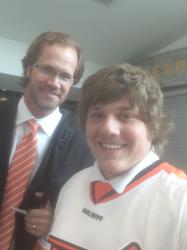Enforcers perform a function that’s fundamental to the game. Without Enforcers, team stars become targets.
The game of hockey has many roles. There are goal scorers, set-up guys, defenders, and goalies. And there’s one role people love, but don’t talk about much … and for good reason. It’s “The Enforcer.”
The Enforcer is one of the most loved players on a team–loved by fans and teammates, that is, but hated by the opponent. Hockey wouldn’t be the same without Enforcers. They protect team stars and team in general. Who wouldn’t want a giant monster on skates as a bodyguard?
Hockey has always been a physical game. The very first NHL game ended in a line brawl. But we don’t really know who was the game’s first “Enforcer.”

Matthew Barnaby (left) played NHL hockey for 13+ years (photo, CBC.ca)
Regardless of who was the first, we do know there have been unbelievable Enforcers throughout the NHL’s 100-year history. The list includes Matthew Barnaby, Donald Brashear, Tie Domi, and Rob Ray. All of those guys earned the title with their play.
But Enforcers are not without controversy. Some fans and analysts believe that Enforcers shouldn’t be part of the game. I can see why: an Enforcer’s main job is to be extremely physical, that is, fight. But, on the other hand, Enforcers perform a function that’s fundamental to the game. Without Enforcers, team stars become targets. That protection is a big reason why some stars can score 40+ goals a year. Think about it. Without Dave Semenko and Mark Messier, Wayne Gretzky probably wouldn’t have scored 2,857 career points.
Gretzky’s fete is a big part of hockey history. So, too, was the protection offered on a particular team. Back in the 1070’s, the Philadelphia Flyers were called “The Broad Street Bullies.” The Bullies were born after a game against St. Louis. The Blues absolutely demolished the Flyers, and owner Ed Snider vowed that he’d never, ever see his Flyers get bullied like that again.
The Flyers added power and nastiness in the names of Andre “Moose” Dupont, Don Saleski, and Dave “The Hammer” Schultz. Teams hated playing “The Bullies,” but Philly fans (of course) loved it–and for good reason.
With the Enforcers’ protection, players like Bob Clarke, Reggie Leach, and Bill Barber lead the Flyers to two consecutive Stanley Cups.
But success begs a question. If Enforcers help win championships, why would people want them out of the game?
The answer is simple: people don’t want violence. And there’s more to it. Several Enforcers have committed suicide and there’s speculation that these deaths are a result brain damage caused by fights and physical play. While that may be true, in part at least, it’s impossible to make a cause-and-effect connection.
My take is that it would be a mistake to take Enforcers out of the game. Players feel that way, too. In a 2011 poll conducted by the NHLPA and CBC, 98% of 318 players said they didn’t want to ban fighting. Why would almost every player say that? It’s because toughness is a necessity in hockey.
Fights get players and the crowd hyped up. And while fighting is important in the game, the truth is that many are staged. But the truth is also that fighting can change the outcome of a game.

Probert v. Demi (photo, Getty Images)
Consider this example. The fight between Tie Domi and Bob Probert is regarded as one of the greatest hockey fights of all time. The men–considered to be two of the game’s greatest Enforcers–duked it out for over 45 seconds … less than a minute into the game. That fight set the tone … and the home NY crowd loved it!
I’ve concluded that Enforcers are a huge part of hockey and shouldn’t be taken out of the game. I think hockey would be a more dangerous sport without these “Ice Guardians.” It would be less structured with danger lurking everywhere. Enforcers use their hands to punch rather than to score. The game needs them.
















